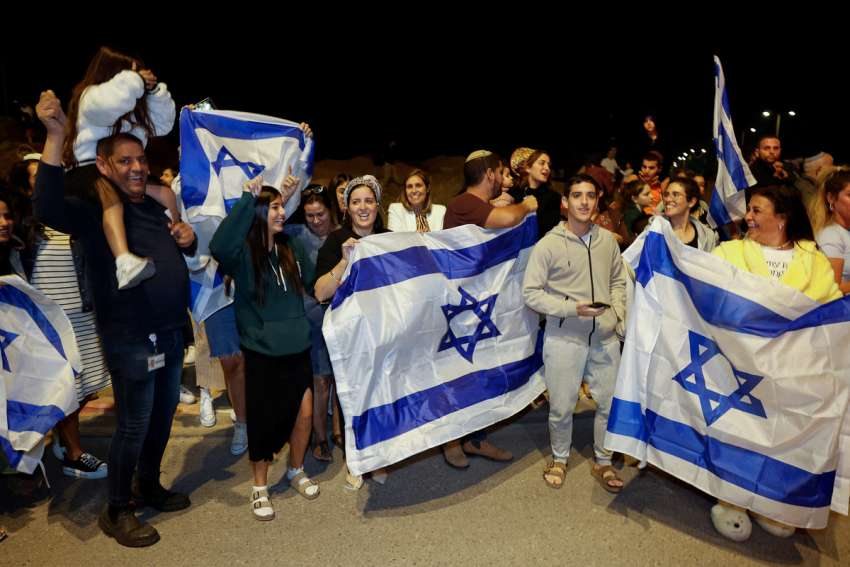TEL AVIV -- It’s a nightmare scenario that no parent would ever want to experience. Fifty days after her children were taken hostage, Hadas Kalderon did not see their names on the list of the first three rounds of released hostages.
Finally on the list of the fourth round of the hostage release Nov. 27, she saw her children, who are returning to Israel from Hamas captivity.
Two weeks after five members of her family were taken captive by Hamas on Oct. 7, two somber-faced members of the Israeli Defense Forces approached the home Kalderon has been staying at with a friend in Tel Aviv after hers was destroyed in the attacks. She told them to go away before slowly collapsing to the floor crying in grief. She couldn’t bear to hear the news.
Among the more than 200 captives Hamas took to Gaza were Laderon’s two youngest children, son Erez, 12, and daughter Sahar, 16; their father, Ofer, 53; her mother Carmela, 80; and niece Noya, 12.
That day, she would learn from the soldiers at her door that her mother and Noya, who was autistic, were found murdered in Gaza.
The last communication with her children came in the form of a frantic text message from another home in the kibbutz as the attack unfolded.
“They told me that they also have terrorists inside their house, and so they jumped from the window and were hiding in the bush. This was the last message I got from them,” Kalderon said.
At the time she was experiencing a nightmare of her own. The Hamas terrorists had now raided her home as well.
She described them as bloodthirsty, going house to house murdering and butchering residents, and even any cats or dogs they came across.
Kalderon spends most days in Tel Aviv now joining other hostage family members in telling their stories to the media in order to keep the focus on those being held captive amid a destructive air and ground campaign being waged.
She steadies her nerves with a cigarette as she worries about the safety of her remaining family in captivity, and how much violence they have been exposed to.
The overall sentiment among Israelis is strongly in favour of removing Hamas from the power it has held in Gaza since it took control of the Strip from Fatah, the rival Palestinian political party, following a civil war in 2007, and has run it since as an autocratic state.
But the families of those taken hostage are calling for a more pragmatic approach in order to protect the lives of as many as possible.
“I’m a mom, I’m not a politician, not an army girl, I just want to believe they behave wisely with good judgment, and they know what they are doing,” Kalderon said of the Israeli government, which she feels should exchange whatever number of Palestinian prisoners are asked for by Hamas to secure the release of the hostages.
“What I want is to save my children. It’s not a game for children. You can’t make war at the expense of children. They are victims. We don’t know when it’s going to end.”
It is the unspoken that is Kalderon’s deepest fear.
“My beautiful girl, she’s 16 and a teenager. Do you have children, do you have a daughter? Then try to imagine that,” she said.
While Kalderon moved away for 10 years from Kibbutz Nir Oz, where she was born, she moved back there to start a family, despite the dangers of living in what’s called the Gaza Envelope. The “Envelope” describes the populated areas in Israel’s southern district near the Gaza Strip border. Set peacefully amid agricultural land, Nir Oz offers open space for children to ride horses and bikes and to play soccer, activities that Erez, Kalderon’s son, greatly enjoyed in better times.
Sahar, her daughter, loved to play guitar, and to dance. She also liked to play Ping-Pong and to draw.
“Who’s going to calm my boy when he’s hysterical,” she asked. “It drives me nuts. It breaks my heart; I prefer not to think.”
About 1,200 people of Israeli and other nationalities were killed, and about 240 taken hostage in the Oct. 7 attacks, including about 30 children. Over 100 Israeli service members have been killed so far during Operation Swords of Iron.
Israel began its response to the Oct. 7 attacks with an air campaign to eliminate Hamas resistance to protect the lives of the ground troops who would storm the Gaza Strip three weeks to the day later.
While Kalderon’s children have been released by Hamas, their father still remains in captivity in Gaza.


